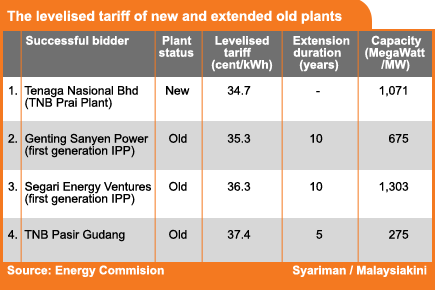The Association of Water and Energy Research Malaysia (Awer) came across a statement issued by the Energy, Green Technology and Water Ministry to the Chinese media on Dec 7, 2013.
Its statement on ‘First Generation Independent Power Producers (IPP) also successfully extended the Power Purchase Agreement (PPA) with lower levelised tariff compared to the original levelised tariff via fair bidding, and the levelised tariff is even lower than the levelised tariff of new power plant’ is misleading the public and businesses.
Based on a media statement released by the Energy Commission on Oct 9, 2012, the levelised tariff of new power plant and extended old plants are as below:

Based on the statement released by the Energy Commission, all power plants mentioned use natural gas as fuel and TNB’s Prai Plant can achieve 60 percent generation efficiency. The TNB’s Prai plant achieved the lowest levelised tariff as shown in the statement which is also available in the Energy Commission’s website.
Now, how can the ministry release a statement that the levelised tariff of extended power purchase agreements (PPAs) are lower than the new power plant’s levelised tariff? Why is the ministry misleading members of a certain community? What was the ministry’s intention? The ministry’s secretary-general must take full responsibility for such a statement made by the ministry to mislead the public and businesses.
Due to increase in natural gas price, the overall impact of fuel cost to tariff is high. Therefore, the only way forward is to ensure efficiency in generation sector is increased continuously. This is also a fact admitted by German consultants appointed by the government itself.
Extension of first generation IPPs’ PPA is not a sustainable and cost-effective decision in the long run and it is against the government’s pledge to increase efficiency in the electricity sector in the 10th Malaysia Plan.
Backing for RCI proposal
Awer would also like to extend our support for proposals to form a royal commission of inquiry (RCI) into issues related to transparency in cost structure of electricity tariff, power purchase agreements (PPAs) and independent power producers (IPPs). We would recommend the terms of reference for the RCI to be as follows:
(i) Formulation of PPAs and its impact to electricity tariff;
(ii) Introduction of natural gas fuel subsidy in 1997 and its relation to capacity charges paid to IPPs;
(iii) Impact of fuel cost subsidy to Petronas for both its capital and operational expenditure;
(iv) Procedures used to enroll all IPPs to sign PPAs;
(v) Review the procedures implemented in current open bidding that started since year 2011 including how certain criteria are set which can hamper actual open bidding process;
(vi) Study the cost breakdown for electricity tariff from 1990 until 2013 and subsequent policy decisions that passed unfair cost to electricity tariff; and
(vii) The failure of first generation IPPs’ PPA renegotiation process.
We urge the prime minister and cabinet to support the formation of this RCI so that all issues related to IPPs and PPAs can be resolved amicably. The RCI must cover the three main issues (transparency in cost structure of electricity tariff, PPAs and IPPs) and adopt the recommended terms of reference by Awer.
Formation of the RCI is an important step by the government to ensure right policies are implemented so that Malaysia remains competitive in long run. It is time for the government to look back at things that were implemented and evaluate the actual impact of certain decisions made.
Do it for Malaysia. People First, Performance Now.
PIARAPAKARAN S is president, Association of Water and Energy Research Malaysia (Awer).

